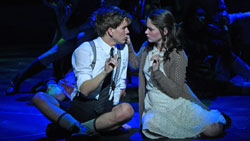On Sept. 27, a revival production of Spring Awakening opened on Broadway. Unlike any other production ever done before, this version of the show combines singing and American Sign Language (ASL), making it accessible to both deaf and hearing audiences.
The original production of Spring Awakening, based on an 1891 play of the same name by Frank Wedekind, opened on Broadway in December 2006, where it won 8 Tony Awards. Its cast included Lea Michele, Johnathon Groff, and John Gallagher Jr.; it then closed in January 2009.
In the summer of 2015, the Deaf West Theatre in North Hollywood, CA, ran a short run of the show where it mixed singing and ASL. Each main character is played by two actors—one hearing actor, who does the singing and speaking, and is called the ‘voice’ of the character, and the other actor, who is deaf or hard of hearing, does the ASL portion. The ASL and choreography are beautifully blended as well, making the production look flawless and polished. Several actors do both the speaking and ASL parts, especially for smaller characters or ensemble parts.
This mix of speaking and ASL makes the musical completely unlike anything else that has ever been done on Broadway before. While Deaf West Theatre is famous for doing productions in this style, this is the first time one of their musicals has transferred to Broadway. It has received nothing but praise from critics. The show has also been slightly altered to make the deaf characters fit even better—for example, the character of Moritz Stiefel, who was always written as a teenager who had trouble in school, is now written as if the character is deaf, which only compounds his problems with his schoolwork and causes him to get into trouble with his teachers, since he appears to be slacking off in class.
Spring Awakening is a rock musical with music by Duncan Sheik and a book and lyrics written by Steven Sater. It is set in late-19th century Germany, where it tells the story of teenagers growing up in a strict, highly-sheltered community and eventually revolting, as well as beginning to explore their own sexualities, something that they were heavily discouraged from doing previously.
The lead characters include Wendla, a naive and innocent teenage girl who has limited knowledge about the facts of adulthood; Melchior, a headstrong and rebellious young man who is more knowledgeable than most of the other teens in the community; and Moritz, a nervous young man who struggles in school and feels intense pressure to understand and succeed in the world. The other characters are mostly teenagers who serve as classmates and friends of the main characters. The adult roles, including parents, teachers, and doctors in the community, are played by two actors: one deaf, one hearing.
The revival cast features many Broadway debuts, especially since many characters are played by deaf actors who previously did not have the opportunity to appear on Broadway. These deaf actors include Sandra Mae Frank (Wendla), Daniel Durant (Moritz), and many other ensemble members. Deaf Oscar-winner Marlee Matlin is also cast, playing the Adult Women. Other actors include Krysta Rodriguez, Andy Mientus, Patrick Page, Katie Boeck (the voice of Wendla), Austin McKenzie (both the voice and ASL performer for Melchior), and Alex Boniello (the voice of Moritz).
The cast also features Ali Stroker, playing the role of Anna (a friend of Wendla’s). Stroker is disabled and wheelchair-bound, and is the first disabled actor to appear on Broadway, adding to the musical’s groundbreaking cast.
Many of the characters also double as musicians, since, unlike many shows, the production does not have an orchestra pit. Instead, the cast plays instruments on the stage as well as performing their roles.
The production will only run for a limited time, closing on Jan. 24. It was originally slated to only run until Jan. 9, but due to hugely positive fan and critical reviews, plus a change in scheduling at the theatre, it was extended for an additional two weeks.
Spring Awakening is currently playing at the Brooks Atkinson Theatre on 47th Street in New York City. Tickets can be found at the box office or on websites such as Ticketmaster and Telecharge.
IMAGE TAKEN from variety.com




